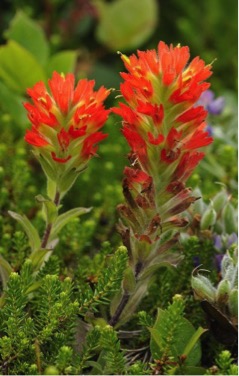Despite all evidence to the contrary,
God will accomplish God’s purposes in Christ.
This bold statement, based on Ephesians 1:10 and Colossians 1:19-20, expressesSoulStream community’s core value of hope. My experience in the Valley of Dry Bonesechoed this hope. Despite evidence to the contrary, God is renewing the earth.
“Well,” the Spirit of the Lord said to me, “shall we move forward?”
Yes, indeed. I liked the sound of “we.” It reminded me of the last line of the Hafiz poemSeed Cracked Open: “God, what love mischief can ‘We’ do for the world today?”
So I paid particular attention to what God was doing and looked for how I was being invited to join God in some “love mischief.”

We were camping in Banff National Park in Alberta. The day after we arrived, Fred and I hiked along Mosquito Creek toward Molar Pass. We were awestruck at every turn. Indian Paintbrush in shades of coral, ruby and magenta, snow-covered peaks, and rushing glacial streams reflected God’s beautiful handiwork.
Meanwhile the tedious, temperamental weather inspired a new version of the Hokey Pokey. It goes like this:
You take your rain gear off,
you put your rain gear on,
you take your rain gear off,
and then you shake it all about.
You give thanks for the sunshine
and you give thanks for the rain.*
That’s what it’s all about.
*Verse 2 insert “snow”; Verse 3 insert “hail”.
If it were up to me, I would choose warm weather with endless sunshine every time. But our land was in dire need of rain. Forest fires were burning all over British Columbia and into Alberta two hundred kilometers from where we camped. So I was thankful for precipitation in any form it came.
Giving thanks for all God’s gifts, including the rain, seems insignificant in the scheme of things (especially when I have a husband who knows how to put up tarps). But according to Pope Francis, it’s an essential part of my conversion if I’m going to help God save the earth.
So what [some Christians] need is an ‘ecological conversion,’ whereby the effects of their encounter with Jesus Christ become evident in their relationship with the world around them. Living our vocation to be protectors of God’s handiwork is essential to a life of virtue; it is not an optional or a secondary aspect of our Christian experience. . .
This conversion calls for a number of attitudes which together foster a spirit of generous care, full of tenderness. First, it entails gratitude and gratuitousness, a recognition that the world is God’s loving gift, and that we are called quietly to imitate God’s generosity in self-sacrifice and good works . . .
— Encyclical Letter, Laudato Si’ of the Holy Father Francis on Care for Our Common Home, May 2015 (#217,220)

Credits and references
“Indian Paintbrush” by Bureau of Land Management Oregon and Washington. Used with permission.
“Camping in Mosquito Creek Campground, Banff” by Fred Hizsa. Used with permission.
© Esther Hizsa,
This is the third of four posts by Esther Hizsa.
 Esther Hizsa is a spiritual director, retreat speaker and writer. She is a member of SoulStream contemplative community and helps facilitate their Living from the Heart course. She and her husband, Fred, live in Burnaby, B.C.They have two married children and two grandchildren. She blogs at An Everyday Pilgrim where this was originally published.
Esther Hizsa is a spiritual director, retreat speaker and writer. She is a member of SoulStream contemplative community and helps facilitate their Living from the Heart course. She and her husband, Fred, live in Burnaby, B.C.They have two married children and two grandchildren. She blogs at An Everyday Pilgrim where this was originally published.
